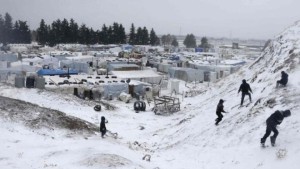Experts worry that harsh invective by leaders could escalate, lead to local provocations
Ha-young Choi
Kim Jong Un directly criticized South Korean President Park Geun-hye’s “hysteria” and “rash behavior” on Friday, saying it would result in her destruction.
Kim’s remarks came via the state-run Rodong Sinmun and Korea Central News Agency (KCNA) online news service.
While it is not uncommon for DPRK state media including the Rodong newspaper and KCNA sites to lash out against South Korea’s leaders, Friday’s remarks represent the first time that Kim himself has criticized Park directly.
“It is a very foolish act for Park Geun Hye to cry for ‘preemptive attack’ while recklessly beefing up the armed forces in league with the U.S. scoundrels, but her hysteria will precipitate only her ruin in the long run,” said Kim, as quoted by the English version of KCNA.
The Korean version of the KCNA went further, though.
“In order to prevent future leaders from silly behavior like Park’s, it is necessary to clearly show the end of Park,” Kim said, warning that “Park should be considerate and behave reasonably, ceasing her rash behavior toward our nuclear armament.
“If Park carries out trivial military behavior, then there won’t be any time to regret,” Kim added.
The KCNA published a much more misogynistic attack on Park on the same day, calling her a “devil, not a women.” Two days earlier it compared Park to a bat.
Seoul’s Ministry of Unification (MoU) said that Kim’s remarks represent an exceptional case. Ministry spokesperson Jung Joon-hee told journalists on Thursday at a regular press briefing that they were the first such remarks from the leader, and called them “verbal terror.”
During her March 1 movement commemoration speech, Park said the North Korean regime was “exploiting” its residents and concentrating on nuclear development for the regime’s survival.
She continued her remarks about the North on Wednesday morning, describing the regime there as a “tyranny.” South Korea’s National Assembly passed its North Korean human rights law the same night.
High-profile politicians have also talked recently about “regime change” in North Korea, including ruling Saenuri Party lawmakers Na Kyung-won and Ha Tae-kyung.
“It is time to consider all measures including regime change,” said Na, who currently serves as chief of the Unification and Foreign Affairs Committee at the National Assembly, last month.
Cheong Seong-chang, senior fellow at the Sejong Institute, expressed concerns over the rising tensions.
“There’s no reason to believe that North Korea won’t choose the extreme option of nuclear weapons if the South threatens the North with a ‘beheading operation,’ a landing operation and the pressure of regime change,” Cheong said.
A former government official said this tension could turn into actual conflict.
“There is the possibility of provocations like the bombardment of Yeonpyeong (in 2010),” Park Sun-won, former secretary for national security strategy under President Roh Moo-hyun told NK News.
“Caution is required before it happens. The provocations might grow bigger, due to the (South Korean) military policy of ‘action first, report later,’” Park said.
Joint U.S.-ROK military drills will commence next week, which have traditionally resulted in higher tensions with Pyongyang.
(Ha-young Choi is an NK News correspondent based in Seoul. She studied Korean history, mainly focusing on modern Korean history at Korea University. Follow her on twitter @Hy_Choi0826)




